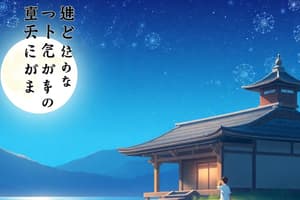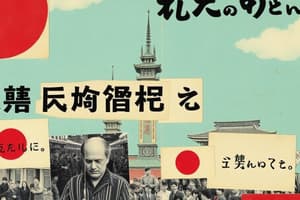Podcast
Questions and Answers
When would you most appropriately use the greeting 'Konnichiwa'?
When would you most appropriately use the greeting 'Konnichiwa'?
- When saying goodbye to someone at night.
- When introducing yourself for the first time.
- During the daytime to say 'Hello'. (correct)
- When answering a question in class.
Which phrase is used when formally meeting someone for the first time?
Which phrase is used when formally meeting someone for the first time?
- Genki desu ka?
- Hajimemashite (correct)
- Oyasumi nasai
- Arigatou gozaimasu
In the phrase 'Watashi wa [name] desu,' what does 'desu' indicate?
In the phrase 'Watashi wa [name] desu,' what does 'desu' indicate?
- It is a casual way to end a sentence.
- It makes the sentence polite and complete. (correct)
- It indicates that you are asking a question.
- It is a possessive pronoun.
After introducing yourself in Japanese, which phrase is appropriate to say?
After introducing yourself in Japanese, which phrase is appropriate to say?
What is the difference between 'Genki desu ka?' and 'Genki?'?
What is the difference between 'Genki desu ka?' and 'Genki?'?
In a Japanese classroom, what is the correct order of actions at the beginning of a class?
In a Japanese classroom, what is the correct order of actions at the beginning of a class?
When is it appropriate to use the honorific 'san'?
When is it appropriate to use the honorific 'san'?
If a teacher says 'Shusseki wo torimasu,' what are they about to do?
If a teacher says 'Shusseki wo torimasu,' what are they about to do?
What is the appropriate response when your name is called during attendance in a Japanese class?
What is the appropriate response when your name is called during attendance in a Japanese class?
What is the difference between 'Arigatou gozaimasu' and 'Arigatou'?
What is the difference between 'Arigatou gozaimasu' and 'Arigatou'?
Which phrase would you use to politely ask someone for a favor?
Which phrase would you use to politely ask someone for a favor?
If someone asks you if you speak English in Japanese ('Eigo ga hanasemasu ka?'), and you understand the question, how would you indicate that you understand?
If someone asks you if you speak English in Japanese ('Eigo ga hanasemasu ka?'), and you understand the question, how would you indicate that you understand?
What does 'Daijoubu desu' mean?
What does 'Daijoubu desu' mean?
What is the term for a chain or group of islands, such as Japan?
What is the term for a chain or group of islands, such as Japan?
Which of the following is NOT one of the four main islands of Japan?
Which of the following is NOT one of the four main islands of Japan?
What is Hokkaido primarily known for?
What is Hokkaido primarily known for?
Which major cities are located on the island of Honshu?
Which major cities are located on the island of Honshu?
What is a significant characteristic of Kyushu?
What is a significant characteristic of Kyushu?
Which island is known for its beautiful temples and natural beauty?
Which island is known for its beautiful temples and natural beauty?
Why does Japan experience frequent earthquakes?
Why does Japan experience frequent earthquakes?
What type of natural disaster can be caused by the sudden lifting of the seabed due to earthquakes in Japan?
What type of natural disaster can be caused by the sudden lifting of the seabed due to earthquakes in Japan?
What is Mount Fuji best known for?
What is Mount Fuji best known for?
Which city is famous for Dotonbori, a lively entertainment district known for its food culture?
Which city is famous for Dotonbori, a lively entertainment district known for its food culture?
Which city is known for the Peace Memorial Park and Children's Peace Monument?
Which city is known for the Peace Memorial Park and Children's Peace Monument?
Which city is famous for its Yatai (street food stalls), especially serving ramen and yakitori?
Which city is famous for its Yatai (street food stalls), especially serving ramen and yakitori?
What is Otaru famous for?
What is Otaru famous for?
Which of the following statements best describes Japan's tectonic situation?
Which of the following statements best describes Japan's tectonic situation?
Which concept emphasizes the significant influence of Japan’s mountains, rivers, and ocean proximity on its culture, food, and traditions?
Which concept emphasizes the significant influence of Japan’s mountains, rivers, and ocean proximity on its culture, food, and traditions?
How does the combination of frequent earthquakes and mountainous terrain affect urban planning and architecture in Japan?
How does the combination of frequent earthquakes and mountainous terrain affect urban planning and architecture in Japan?
Flashcards
Konnichiwa (こんにちは)
Konnichiwa (こんにちは)
"Good day" or "Hello" (used during the day).
Ohayou gozaimasu (おはようございます)
Ohayou gozaimasu (おはようございます)
"Good morning" (formal).
Konbanwa (こんばんは)
Konbanwa (こんばんは)
"Good evening."
Oyasumi nasai (おやすみなさい)
Oyasumi nasai (おやすみなさい)
Signup and view all the flashcards
Hajimemashite (はじめまして)
Hajimemashite (はじめまして)
Signup and view all the flashcards
Watashi wa [name] desu (私は [name] です)
Watashi wa [name] desu (私は [name] です)
Signup and view all the flashcards
Douzo yoroshiku onegai shimasu (どうぞよろしくお願いします)
Douzo yoroshiku onegai shimasu (どうぞよろしくお願いします)
Signup and view all the flashcards
Genki desu ka? (元気ですか?)
Genki desu ka? (元気ですか?)
Signup and view all the flashcards
Hai, genki desu (はい、元気です)
Hai, genki desu (はい、元気です)
Signup and view all the flashcards
Maa maa desu (まあまあです)
Maa maa desu (まあまあです)
Signup and view all the flashcards
Iie, chotto... (いいえ、ちょっと...)
Iie, chotto... (いいえ、ちょっと...)
Signup and view all the flashcards
Kiritsu (きりつ)
Kiritsu (きりつ)
Signup and view all the flashcards
Rei (れい)
Rei (れい)
Signup and view all the flashcards
Chakuseki (着席)
Chakuseki (着席)
Signup and view all the flashcards
San (さん)
San (さん)
Signup and view all the flashcards
Sensei (先生)
Sensei (先生)
Signup and view all the flashcards
Shusseki wo torimasu (出席を取ります)
Shusseki wo torimasu (出席を取ります)
Signup and view all the flashcards
Hai (はい)
Hai (はい)
Signup and view all the flashcards
[Name]-san wa kesseki desu ([Name] is absent)
[Name]-san wa kesseki desu ([Name] is absent)
Signup and view all the flashcards
Arigatou gozaimasu (ありがとうございます)
Arigatou gozaimasu (ありがとうございます)
Signup and view all the flashcards
Sumimasen (すみません)
Sumimasen (すみません)
Signup and view all the flashcards
Gomen nasai (ごめんなさい)
Gomen nasai (ごめんなさい)
Signup and view all the flashcards
Iie (いいえ)
Iie (いいえ)
Signup and view all the flashcards
O-negai shimasu (お願いします)
O-negai shimasu (お願いします)
Signup and view all the flashcards
Daijoubu desu (大丈夫です)
Daijoubu desu (大丈夫です)
Signup and view all the flashcards
Wakarimasu (分かります)
Wakarimasu (分かります)
Signup and view all the flashcards
Wakarimasen (分かりません)
Wakarimasen (分かりません)
Signup and view all the flashcards
Eigo ga hanasemasu ka? (英語が話せますか?)
Eigo ga hanasemasu ka? (英語が話せますか?)
Signup and view all the flashcards
Archipelago
Archipelago
Signup and view all the flashcards
Tectonic Plates
Tectonic Plates
Signup and view all the flashcards
Study Notes
Basic Greetings
- "Konnichiwa" translates to "Good day" or "Hello," and is used during the daytime.
- "Ohayou gozaimasu" means "Good morning" (formal), while "Ohayou" is the casual version.
- "Konbanwa" means "Good evening."
- "Oyasumi nasai" means "Good night" (formal), while "Oyasumi" is the casual version.
Self-Introduction
- "Hajimemashite" means "Nice to meet you," and is always said when meeting someone for the first time.
- "Watashi wa [name] desu" translates to "I am [name]," with "Watashi wa" meaning "I" or "As for me," and desu being a polite sentence ending.
- "Douzo yoroshiku onegai shimasu" means "Please take care of me" or a more formal "Nice to meet you," and is said after introducing yourself.
Asking "How are you?"
- "Genki desu ka?" means "How are you?" (casual).
- "O-genki desu ka?" means "How are you?" (polite).
- "Hai, genki desu" translates to "Yes, I'm well."
- "Maa maa desu" translates to "I'm okay."
- "Iie, chotto..." means "No, not really…"
Classroom Etiquette (Kiritsu-Rei-Chakuseki)
- "Kiritsu" means "Stand up," with everyone standing at the start of class.
- "Rei" means "Bow," with everyone bowing to show respect.
- "Chakuseki" means "Sit down," with everyone sitting after bowing.
Polite and Casual Speech
- Polite speech uses "desu" and "ka."
- "Genki desu ka?" means "How are you?" (polite).
- "Genki?" means "How are you?" (informal/casual).
Titles and Addressing People
- "San" (さん) is used as Mr./Ms. for people you don’t know well or in formal contexts, such as "John-san" (Mr. John); it cannot be used for yourself.
- "Sensei" (先生) is used for teachers, professors, or experts, such as "Tanaka-sensei" (Mr./Ms. Tanaka, the teacher).
Classroom Phrases (Attendance)
- "Shusseki wo torimasu" means "I will take attendance" (said by the teacher).
- Students respond with "Hai" (はい) = "Yes" when their name is called.
- "[Name]-san wa kesseki desu" means "[Name] is absent".
Important Vocabulary and Phrases
- "Arigatou gozaimasu" means "Thank you very much" (polite), with "Arigatou" being the casual version.
- "Sumimasen" translates to "Excuse me" or "I'm sorry."
- "Gomen nasai" means "I'm sorry" (more formal).
- "Hai" (はい) means "Yes."
- "Iie" (いいえ) means "No."
Commonly Used Japanese Phrases
- "O-negai shimasu" means "Please" (when asking for a favor).
- "Daijoubu desu" means "It's okay" or "I'm fine."
- "Wakarimasu" means "I understand."
- "Wakarimasen" means "I don't understand."
- "Eigo ga hanasemasu ka?" means "Can you speak English?"
Geography of Japan
- Japan is an island nation in East Asia, east of the Korean Peninsula and China.
- Japan experiences four distinct seasons due to its longitude.
- Japan is an archipelago, consisting of 14,125 islands, with only about 260 inhabited.
- The four main islands are Hokkaido, Honshu, Kyushu, and Shikoku.
The Four Main Islands
- Hokkaido is the northernmost island with cold winters; its capital is Sapporo, known for snow festivals and parks.
- Honshu is the largest and most populous, housing major cities like Tokyo, Kyoto, and Osaka, and Mount Fuji.
- Kyushu is the third-largest and southernmost, influenced by its proximity to the Asian continent; Fukuoka is a major city known for street food (Yatai).
- Shikoku is the smallest of the four, between Honshu and Kyushu, and is known for temples and natural beauty.
Tectonic Plates and Earthquakes
- Japan sits on the boundary of four major tectonic plates: Pacific, North American, Eurasian, and Filipino.
- The movement of these plates causes frequent earthquakes, making seismic activity a significant part of life.
- Earthquakes can cause tsunamis, which are destructive ocean waves.
Key Landmarks and Locations
- Mount Fuji is Japan's tallest mountain at 3,776 meters, an active volcano and a UNESCO World Heritage site on Honshu.
- Tokyo, the capital, is on Honshu's eastern coast, combining modern and historical elements.
- Kyoto, on Honshu, is known for traditional temples, gardens, and sites like Kinkaku-ji and Fushimi Inari Taisha.
- Osaka, a major city in Honshu, is known for food culture and the Dotonbori entertainment district.
- Hiroshima, on Honshu's western side, is known for the Peace Memorial Park.
- Nara is known for deer roaming freely in Nara Park and the Great Buddha statue in Tōdai-ji Temple.
- Fukuoka, on Kyushu, is famous for Yatai (street food stalls).
- Otaru, on Hokkaido, is known for its canal and historic warehouses.
- Ritsurin Garden, in Takamatsu, Shikoku, is a historical Japanese garden.
Key Terms
- Archipelago: A group or chain of islands, such as Japan's 14,125 islands.
- Tectonic Plates: Large pieces of the Earth's crust that move and cause seismic activity.
- Volcano: A mountain formed by the eruption of molten rock.
- Earthquake: A sudden shaking of the ground caused by movements in the Earth's crust.
- Tsunami: A series of large ocean waves caused by the displacement of water.
Studying That Suits You
Use AI to generate personalized quizzes and flashcards to suit your learning preferences.




